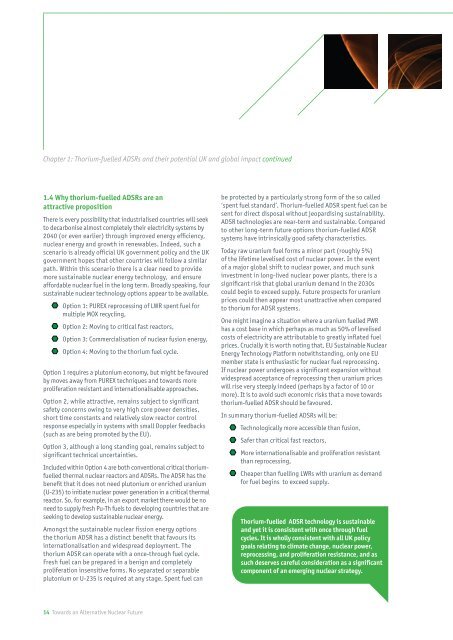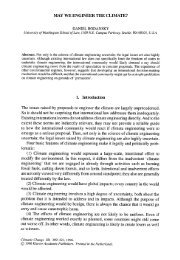ThorEA - Towards an Alternative Nuclear Future.pdf
ThorEA - Towards an Alternative Nuclear Future.pdf
ThorEA - Towards an Alternative Nuclear Future.pdf
Create successful ePaper yourself
Turn your PDF publications into a flip-book with our unique Google optimized e-Paper software.
Chapter 1: Thorium-fuelled ADSRs <strong>an</strong>d their potential UK <strong>an</strong>d global impact continued<br />
1.4 Why thorium-fuelled ADSRs are <strong>an</strong><br />
attractive proposition<br />
There is every possibility that industrialised countries will seek<br />
to decarbonise almost completely their electricity systems by<br />
2040 (or even earlier) through improved energy efficiency,<br />
nuclear energy <strong>an</strong>d growth in renewables. Indeed, such a<br />
scenario is already official UK government policy <strong>an</strong>d the UK<br />
government hopes that other countries will follow a similar<br />
path. Within this scenario there is a clear need to provide<br />
more sustainable nuclear energy technology, <strong>an</strong>d ensure<br />
affordable nuclear fuel in the long term. Broadly speaking, four<br />
sustainable nuclear technology options appear to be available.<br />
Option 1: PUREX reprocessing of LWR spent fuel for<br />
multiple MOX recycling,<br />
Option 2: Moving to critical fast reactors,<br />
Option 3: Commercialisation of nuclear fusion energy,<br />
Option 4: Moving to the thorium fuel cycle.<br />
Option 1 requires a plutonium economy, but might be favoured<br />
by moves away from PUREX techniques <strong>an</strong>d towards more<br />
proliferation resist<strong>an</strong>t <strong>an</strong>d internationalisable approaches.<br />
Option 2, while attractive, remains subject to signific<strong>an</strong>t<br />
safety concerns owing to very high core power densities,<br />
short time const<strong>an</strong>ts <strong>an</strong>d relatively slow reactor control<br />
response especially in systems with small Doppler feedbacks<br />
(such as are being promoted by the EU).<br />
Option 3, although a long st<strong>an</strong>ding goal, remains subject to<br />
signific<strong>an</strong>t technical uncertainties.<br />
Included within Option 4 are both conventional critical thoriumfuelled<br />
thermal nuclear reactors <strong>an</strong>d ADSRs. The ADSR has the<br />
benefit that it does not need plutonium or enriched ur<strong>an</strong>ium<br />
(U-235) to initiate nuclear power generation in a critical thermal<br />
reactor. So, for example, in <strong>an</strong> export market there would be no<br />
need to supply fresh Pu-Th fuels to developing countries that are<br />
seeking to develop sustainable nuclear energy.<br />
Amongst the sustainable nuclear fission energy options<br />
the thorium ADSR has a distinct benefit that favours its<br />
internationalisation <strong>an</strong>d widespread deployment. The<br />
thorium ADSR c<strong>an</strong> operate with a once-through fuel cycle.<br />
Fresh fuel c<strong>an</strong> be prepared in a benign <strong>an</strong>d completely<br />
proliferation insensitive forms. No separated or separable<br />
plutonium or U-235 is required at <strong>an</strong>y stage. Spent fuel c<strong>an</strong><br />
14 <strong>Towards</strong> <strong>an</strong> <strong>Alternative</strong> <strong>Nuclear</strong> <strong>Future</strong><br />
be protected by a particularly strong form of the so called<br />
‘spent fuel st<strong>an</strong>dard’. Thorium-fuelled ADSR spent fuel c<strong>an</strong> be<br />
sent for direct disposal without jeopardising sustainability.<br />
ADSR technologies are near-term <strong>an</strong>d sustainable. Compared<br />
to other long-term future options thorium-fuelled ADSR<br />
systems have intrinsically good safety characteristics.<br />
Today raw ur<strong>an</strong>ium fuel forms a minor part (roughly 5%)<br />
of the lifetime levelised cost of nuclear power. In the event<br />
of a major global shift to nuclear power, <strong>an</strong>d much sunk<br />
investment in long-lived nuclear power pl<strong>an</strong>ts, there is a<br />
signific<strong>an</strong>t risk that global ur<strong>an</strong>ium dem<strong>an</strong>d in the 2030s<br />
could begin to exceed supply. <strong>Future</strong> prospects for ur<strong>an</strong>ium<br />
prices could then appear most unattractive when compared<br />
to thorium for ADSR systems.<br />
One might imagine a situation where a ur<strong>an</strong>ium fuelled PWR<br />
has a cost base in which perhaps as much as 50% of levelised<br />
costs of electricity are attributable to greatly inflated fuel<br />
prices. Crucially it is worth noting that, EU Sustainable <strong>Nuclear</strong><br />
Energy Technology Platform notwithst<strong>an</strong>ding, only one EU<br />
member state is enthusiastic for nuclear fuel reprocessing.<br />
If nuclear power undergoes a signific<strong>an</strong>t exp<strong>an</strong>sion without<br />
widespread accept<strong>an</strong>ce of reprocessing then ur<strong>an</strong>ium prices<br />
will rise very steeply indeed (perhaps by a factor of 10 or<br />
more). It is to avoid such economic risks that a move towards<br />
thorium-fuelled ADSR should be favoured.<br />
In summary thorium-fuelled ADSRs will be:<br />
Technologically more accessible th<strong>an</strong> fusion,<br />
Safer th<strong>an</strong> critical fast reactors,<br />
More internationalisable <strong>an</strong>d proliferation resist<strong>an</strong>t<br />
th<strong>an</strong> reprocessing,<br />
Cheaper th<strong>an</strong> fuelling LWRs with ur<strong>an</strong>ium as dem<strong>an</strong>d<br />
for fuel begins to exceed supply.<br />
Thorium-fuelled ADSR technology is sustainable<br />
<strong>an</strong>d yet it is consistent with once through fuel<br />
cycles. It is wholly consistent with all UK policy<br />
goals relating to climate ch<strong>an</strong>ge, nuclear power,<br />
reprocessing, <strong>an</strong>d proliferation resist<strong>an</strong>ce, <strong>an</strong>d as<br />
such deserves careful consideration as a signific<strong>an</strong>t<br />
component of <strong>an</strong> emerging nuclear strategy.



